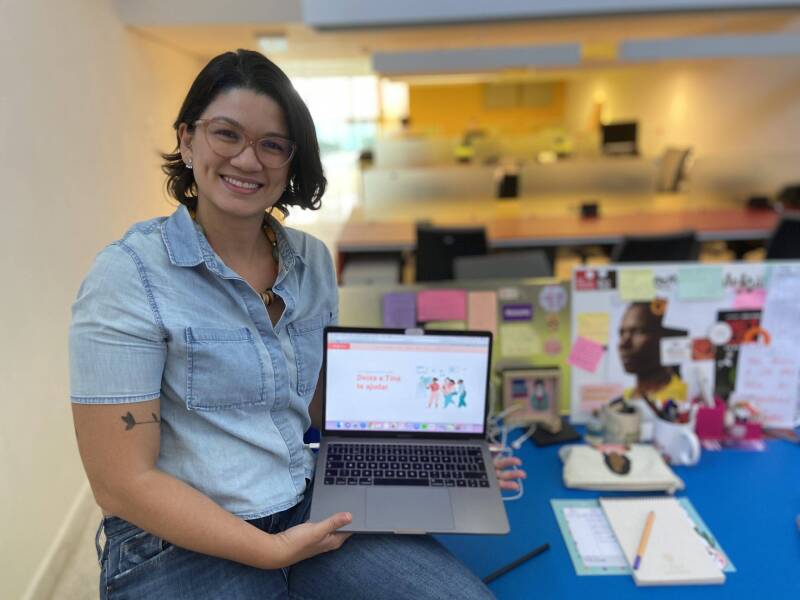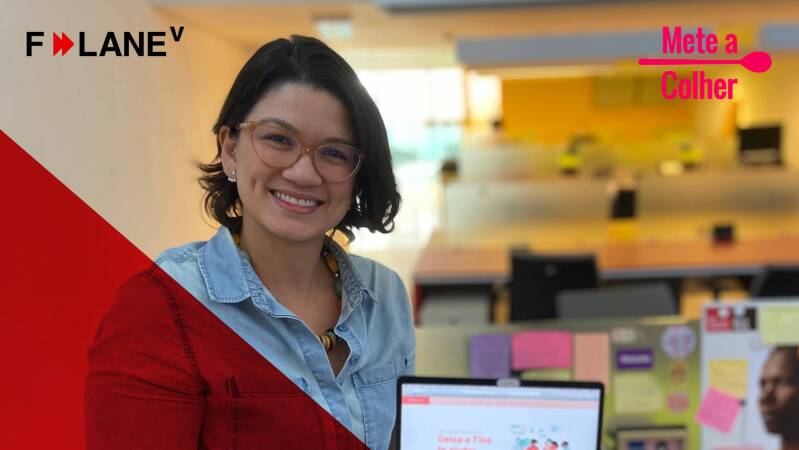Meet Renata Albertim, CEO and founder of Mete a Colher – which roughly translates to ‘getting a word in’ – a start-up that uses technology to combat violence against women in Brazil. Founded in 2016 with the mission of helping women suffering from domestic violence and offering support to help them get out of abusive relationships. In this interview we talk about Renata’s experience at F-LANE, the challenges for female founders, her goals, and how Mete a Colher is changing social businesses.
What are your tips for starting a company?
“Find a Co-Founder that you really trust in going all the way with you and the company, and helping you achieve what you want to achieve.”
What challenges and obstacles did you experience as a female founder?
“During the five years I have been acting as a social impact entrepreneur, I realized the main challenges are finding a business model and finding your first clients. We have been operating for five years, but we had our first client just last year. Without any revenue, it’s hard to keep the start-up running. It’s also difficult that people see us as volunteers and as an NGO that does nice things, but they don’t see the actual problems that we solve. So it’s hard to get any investment.”

Do you think as a female founder it’s even more difficult?
“Yes, I think it’s more difficult, but on the other hand, it’s also very exciting. Every day, I face new challenges and have to come up with new solutions. Finding new opportunities and creating new ideas makes me feel alive. But yes, for men it’s definitely easier to establish a business, at least in Brazil. It’s about the start-up environment where men are simply advantaged, for example in reports, that include male-led businesses, even though they are failing, but refuse to talk to successful female founders. For them, the way is already paved, and for women, it’s not. So far, everything in this corporate/start-up world was built by men, and they create what is good for them, not for us. We’re making progress of course, but it’s still hard, for example, to get investment as a female founder. These places were not built for people like me. I try to change my perception and feel more comfortable, but it’s still difficult.”
Do you see trends in the start-up system towards more inclusivity?
“I think people definitely started talking more about diversity, not just gender but also issues regarding race or sexuality. Also, corporations started to realize that it can be advantageous to contribute to society in that way, for marketing reasons for instance. Of course, all of this is going slowly and we need to go further, but we are trying and we’re not giving up. For example, the UN’s SDG challenges really help bring more attention to these topics.”
If you could change one thing to bring more women to entrepreneurship, what would it be?
“Everybody who is a part of this entrepreneur world has to believe more in women, be convinced that we can change the world, and see the advantages of bringing more women to the table. People need to understand that everybody benefits more from female participation. When women get higher salaries or get promotions, they can better provide for their kids, their families, and for their communities.”
What was the sector like before Mete a Colher?
“Before Mete a Colher was born, I didn’t see many platforms to support women who experience domestic violence. When we created Mete a Colher in 2016, our idea and purpose were very innovative and it brought a new wave and inspired other projects to combat violence against women.
Over the years, the agenda for combating violence against women has migrated from the social sphere to a private sphere because more negative impacts of domestic violence became visible. Companies stopped thinking that violence has a negative impact only on women’s lives and started to understand that violence has a negative impact on the economy of a company and the country, which was also proved by domestic and international research and studies. Based on this new approach and seeing this movement as a market opportunity, we created Tina, a platform to attend, embrace, and support female employees of large companies that are experiencing domestic violence. In our work we give direct support to women, knowing that this will contribute to improving the company’s economy.”

How does Mete a Colher differentiate itself from other services and why is it better?
“Mete a Colher and Tina stand out from other competitors because we are specialized in combating domestic violence against women. Our competitors are compliance channels, which do not have specialized support to deal with cases of domestic violence, or they are gender consultants who do not offer a channel for attending and supporting employees.
Currently, in addition to providing specialized assistance to employees, Tina also develops monthly reports to present all cases to the client, creates communication campaigns (endomarketing) to share among all employees in the company, and develops training to teach managers and c-levels to combat violence against women in a practical way.”
What was your favourite part of F-LANE?
“My favorite part was about understanding how the investment system runs, and what investors are looking for in a start-up. We also learned why it’s important to do impact measurement. For me, this came at the perfect time and it was absolutely amazing.”
What’s next for you?
“I will try to get investment because I now know about the growth potential of Mete a Colher. Investors could help me grow faster and support more women all over the world.”
